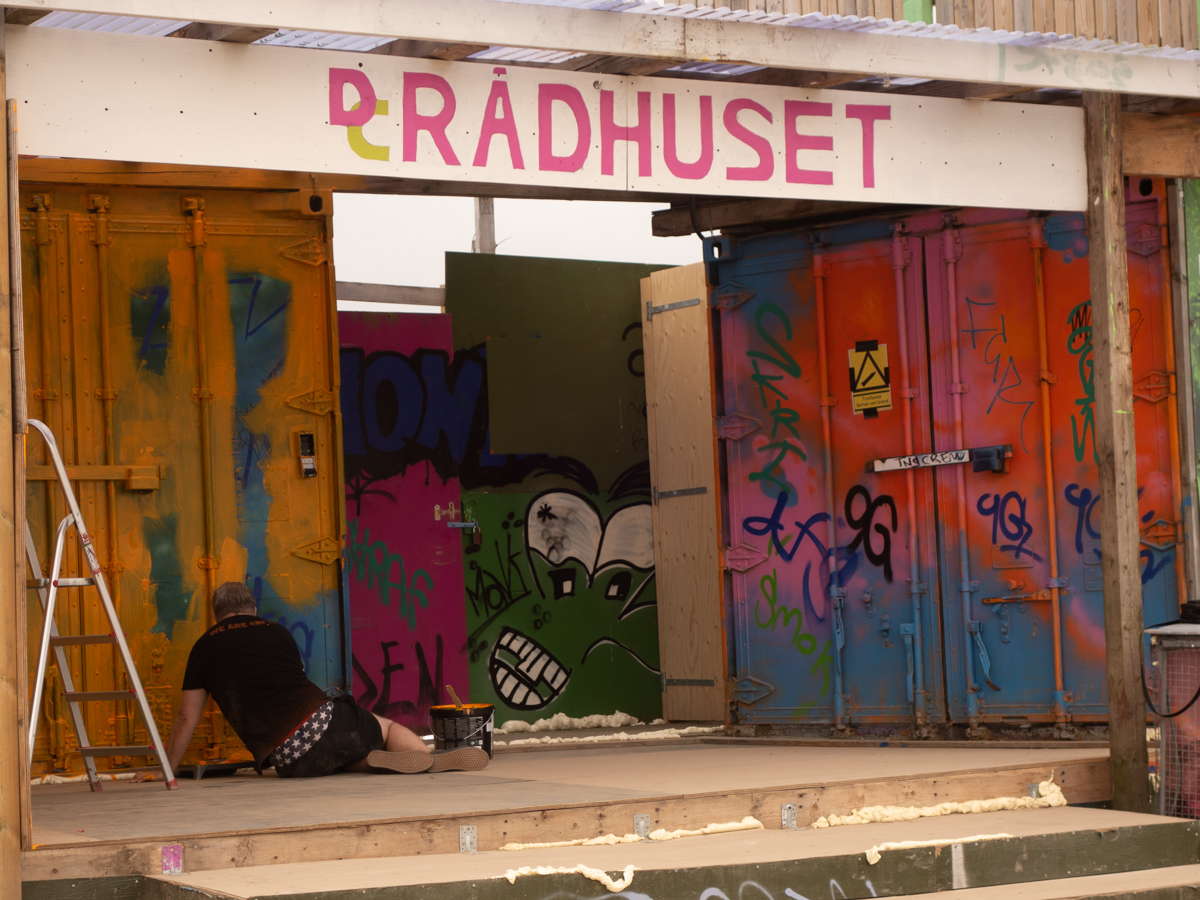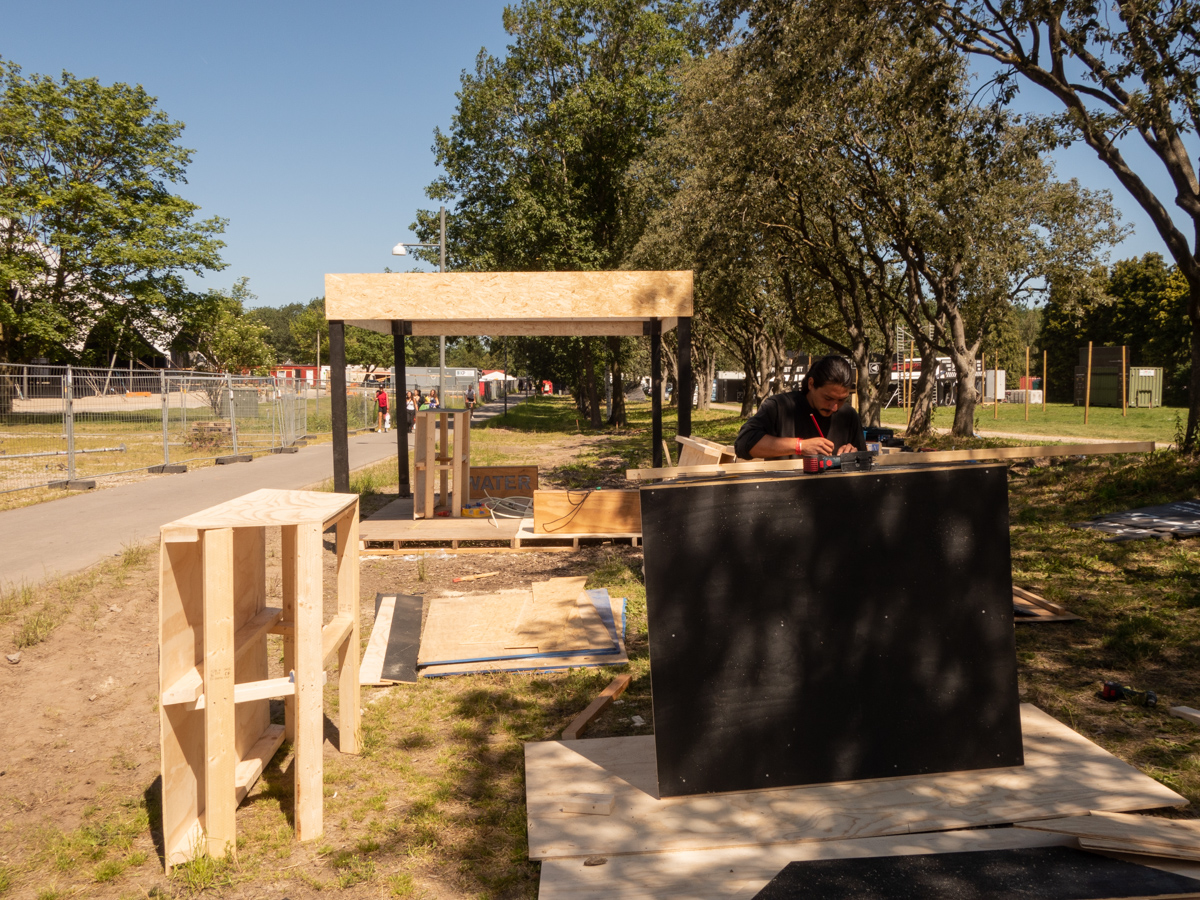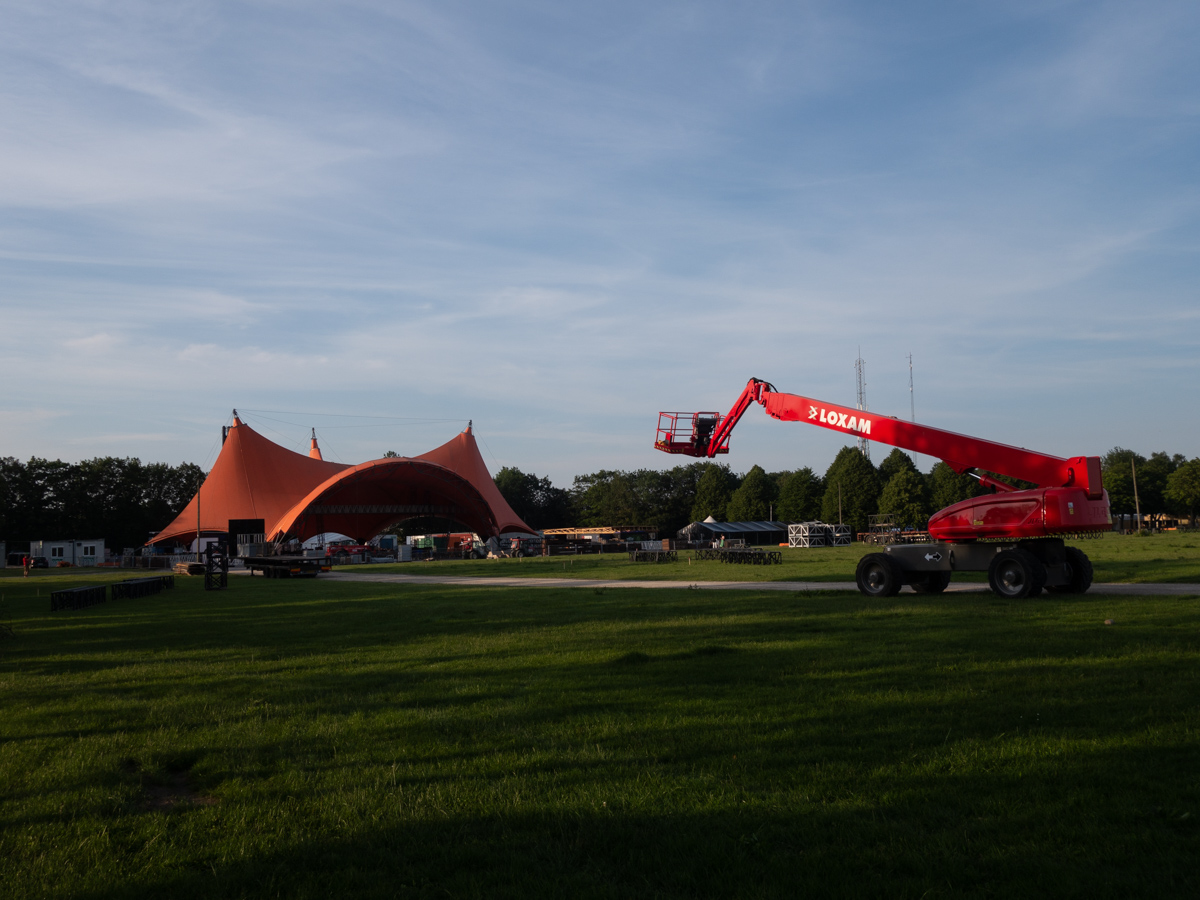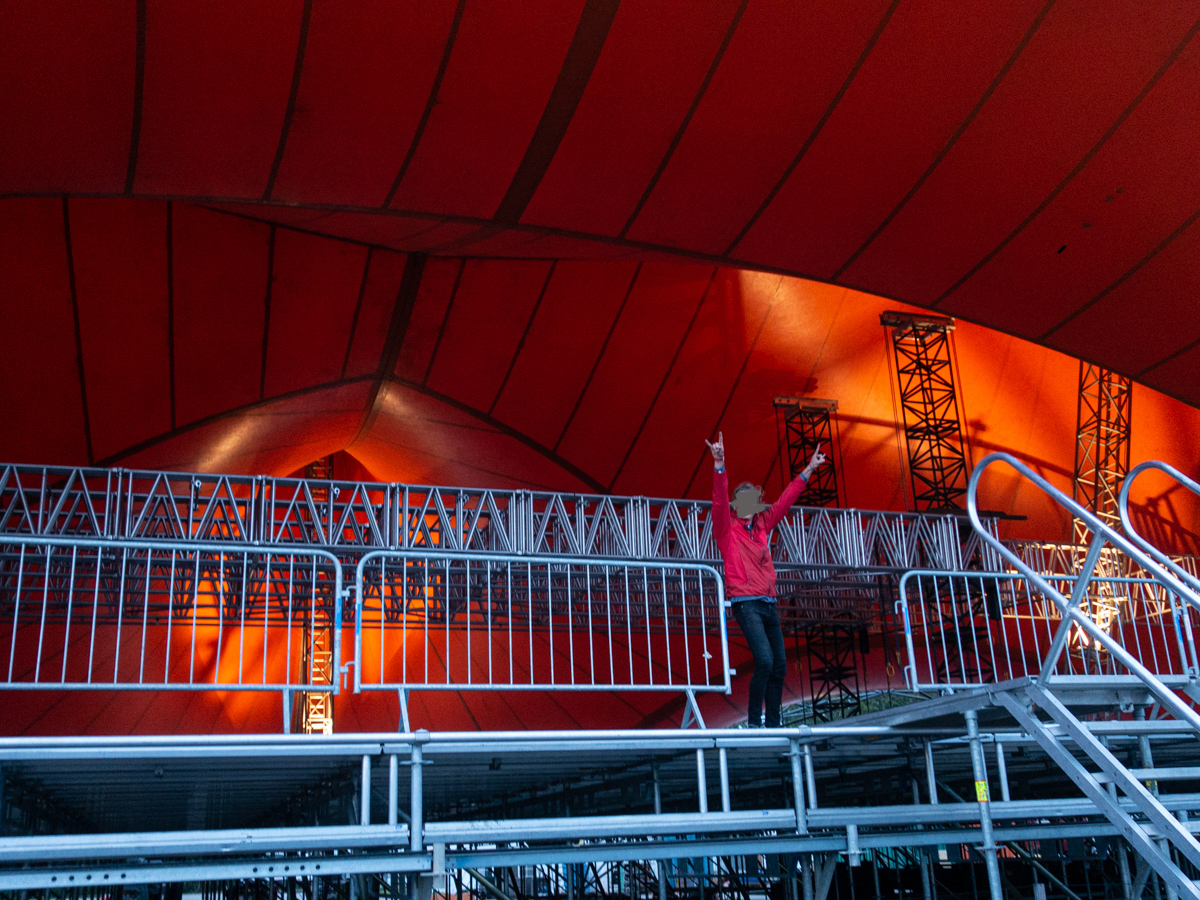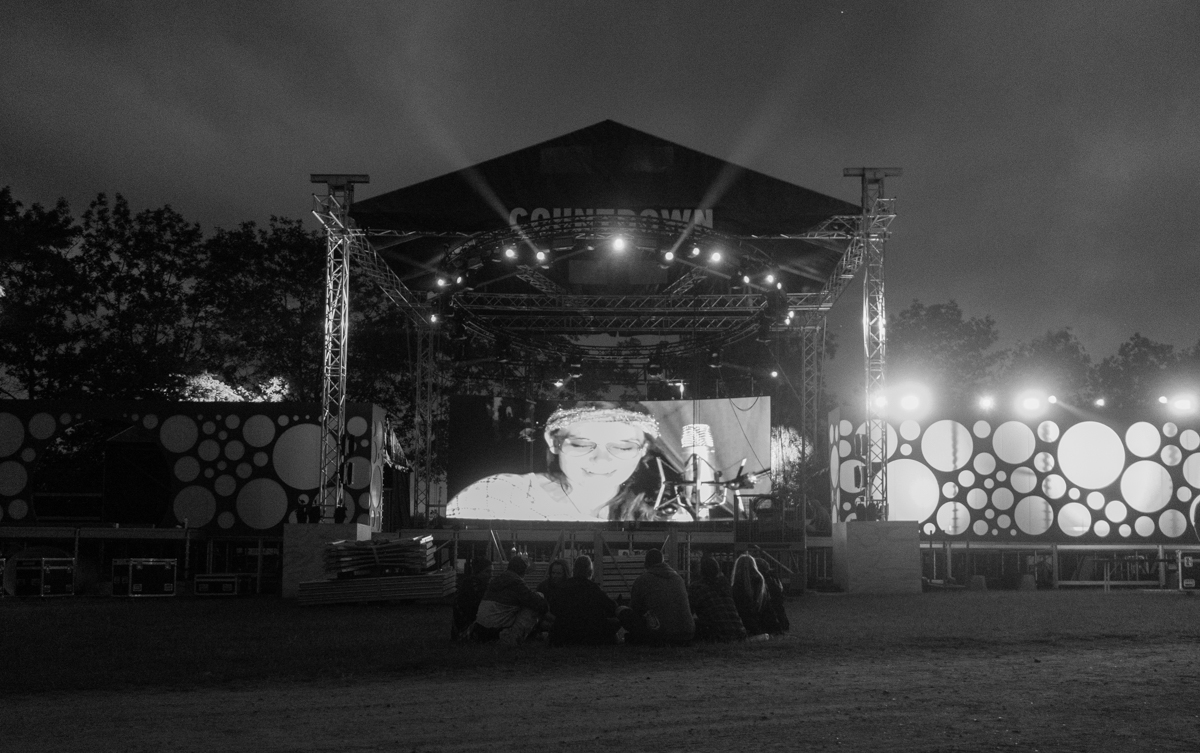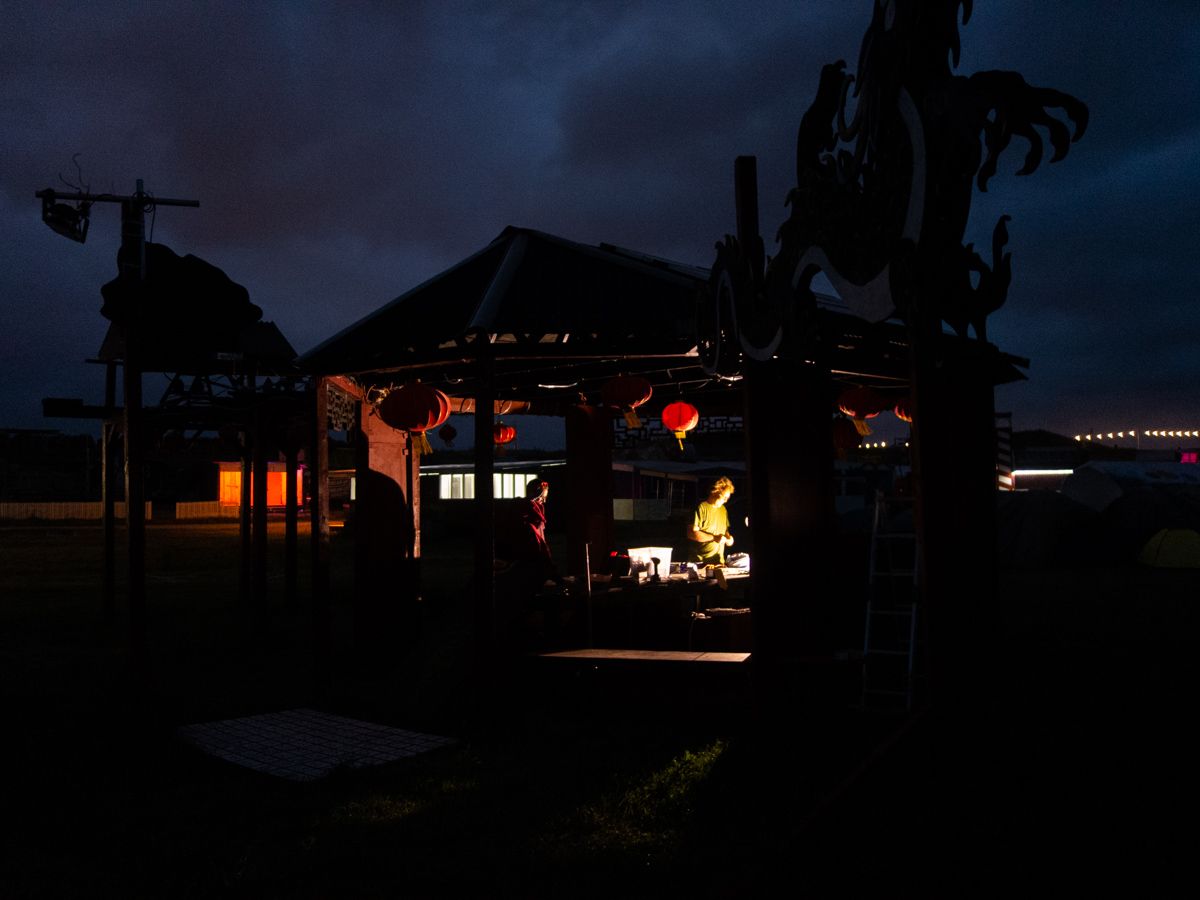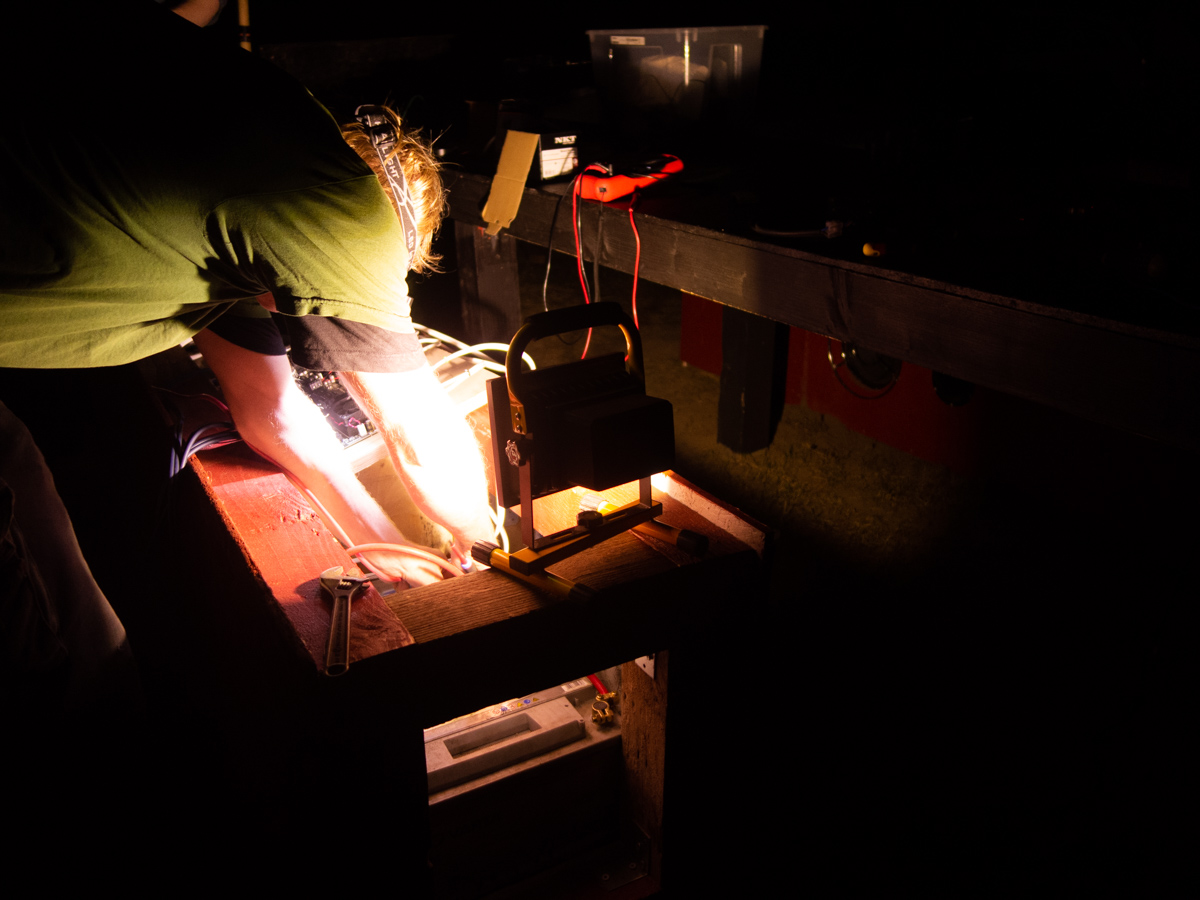With a running time of 8 days, the Roskilde Festival is already a festival for the persevering. Regardless of that, thousands of people extend their experience, arriving early to set everything up for greatness. After all the RF relies on the work of about 30.000 volunteers. Qualified or lay, more of them fill the fields day by day, slowly creating the space that will host one of Europes largest music festivals. In 2019 we went the extra mile, to catch a small glimpse of this process and its protagonists.
text & fotos Jonas Rogge
lesezeit 11 Minuten
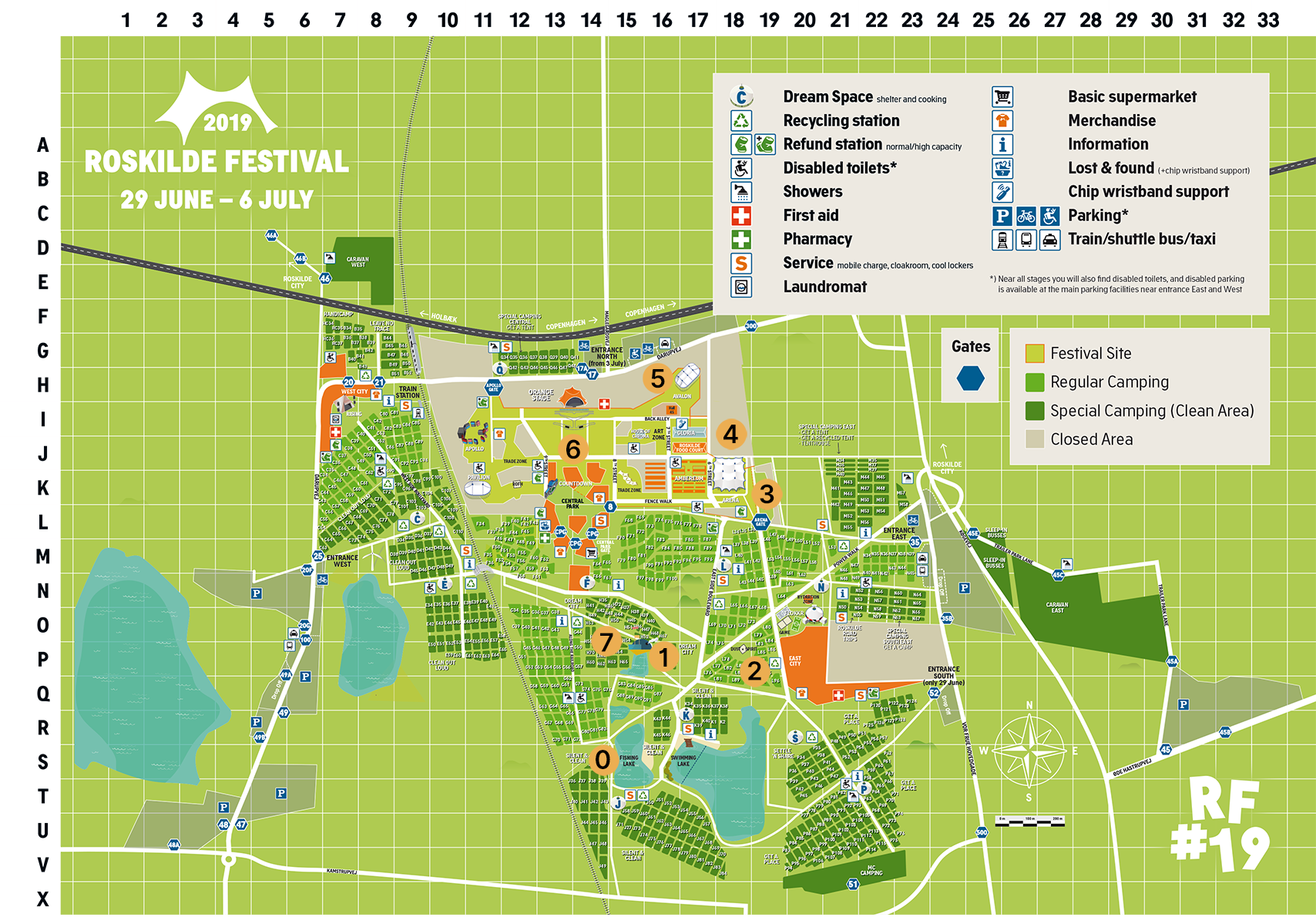
The map was used with the kind permission of Roskilde Festival.
0 - Sorry
Tuesday at noon. I am sitting on a lake, making a cup of coffee with a cafetera on a camping stove. On the opposite shore two men are fishing. While I am sipping on the coffee, contemplating on the fact that it is warm and sunny, a familiar melody pops up into the quiet: „Uh-uhu-ohh, uh-uhu-ohh, de-de-dit-de-dedede”. It is the first song of Roskilde Festival 2019, 'Sorry' by Justin Bieber.
1 – Ghost Town
One of the camps at Dream City was apparently testing their sound system. This area of the camping ground is a theme park, created by the campers of Roskilde. Some of them have been preparing their set-ups for months already. There is a huge wooden shed that looks like a fire station, boats turned into little clubs, a free library, a public kitchen and much more to discover. During the warm-up days the Dream City is the center of attraction, day and night. It is a condensed version of the Roskilde spirit, showing a unique mix of creativity, commitment and an irresistible drive to wild parties.
Apart from this one guy up in the DJ booth I can't make out any other human beings – only 4 days before the festival opens! I was expecting to find the place all in a tumble, with crews rushing to get their constructions done. It is not empty, the things are there, tents set up all around. But there are no people, it seems deserted.
Shortly after I discover a man sitting on the inside of a container, 'DC Radhuset' is written on top of the entrance. Lost in thought, he is painting the inside walls orange.
"Hi, I'm Rasmus. I am now painting our little town hall. It is one of the few buildings here that belong to the organisation of Dream City and is not built by the campers.
I started here in 2013. I am a construction architect. The people building in Dream City come from all different backgrounds. A lot of them have good ideas, but they don't understand constructions. I help them with that. Which is a lot of work, I estimate 500 hours of work every year. In March they come to our workshop and we start working on their projeccts together - '100 days of Festival', we call it.
We use a lot of recycled materials in the construction. Some of it is being re-used every year, screws, iron etc. It is more sustainable to build like that, and cheaper at the same time. Some of the buildings also stay for more than one year, but the maximum is 3-4 years, so it doesn't get boring. That's why we had to take down the church. It had a 8 meters high tower and a little chapel for 20 people. The camp people were the clerics. Actually two priests from the town of Roskilde came to the festival to celebrate a marriage here. It was a crazy project.
We think of all this as a gift to the festival. For example in the 'Bodega', anyone can go and have shots for free. All they ask you for is a smile, just that.”
2 – All Together Now
I am standing on the top of the mountain range in the east of Dream City. Further away I can make out two big white tents. As I climb down the hill and get closer, I see a group of people walking around, laying out wooden signs on the field: “Dust X Spirit” is written on them, in purple and yellow. The complementary colors remind me of the polarities of the festival. The talks, socio-critical art projects and eco-conscious camps on the one hand, the excess, a loud and dirty state of anarchy on the other.
Hi, can you tell me what this is all about?
Sure. My name is Emma. I am from Roskilde Festival Hojskole (ROFH). The 'Hojskole' is a popular thing in Denmark. After finishing regular school, you voluntarily go there for a year, to figure out what you want to do with your life. This school was created with a lot of help from Roskilde Festival. At the school we have created 'Dust X Spirit'. It will be an area on the camping grounds, where festival-goers will come unknown to our place and put their tents up. Then we are going to surprise them with a lot of fun initiatives around sustainability and community.
So they don't know what they are getting into?
No. They'll come running like everyone else. There is also the other initiatives like 'Clean out Loud' where you actively book an area and you know that you are in a special camping site. What we want to do, is make this spread: that you clean up after yourself and you sort your garbage and you come join the whole party, instead of just staying in your own isolated camp.
How much time did you put into this?
We started the school in January. Two months ago we started going really hardcore into this project, first developing the scenography: We created these two big tents to host different events. One for the loud activities, such as a music quiz. The other tent will be more introvert, you can go there to have a bit of quiet time. There will be a piano concert and meditations in the morning.
How did you get into the school? Inspired by the festival?
The coolest thing is that there are so many different characters here. Some people want to focus on journalism, others wanted to just play music and then some people want to build stuff. So everybody is here for a different reason, but what we all have in common is this festival. This is a place where we are excited every year to come and just have a blast. It's really cliche, but we talked so much about that 'orange feeling', of being in a place, where you just feel like 'no matter who you are, no matter what you want to do at the festival, you can feel like you belong'. And that's really wonderful and that's kind of the vibe we have at our school as well.
And you don't get desperate, seeing the camping ground after the festival?
I mean, it's a fucking chaos after the festival and you think 'Why the fuck are we doing this? This is silly, why do we come here?' This can not be sustainable, but at the same time, we can not live our life completely by the rules, we also need to have our fun. For me, what is exciting about our project, is to make this feeling of wanting to let loose be compatible with responsibility and actually picking up after yourself. I think that is really important, both aspects are really important in life.
3 - There's no Place I'd rather be
The Arena, Roskildes second biggest stage, is just a huge tent covering a plane empty surface. Traces of construction vehicles in the sand speak of all the work left to do, before Tears For Fears will open the scene next Wednesday. On the periphery the construction of a little bar-like shed has progressed a bit further already.
Can you tell us who you are are and what you are doing?
I am Santiago from Argentina. We are building sheds for LoveSprings. They sell water bottles and use the earnings for making wells in developing countries, mostly in Africa. People that don't have access to water. Charity, let's say.
What's your next step?
They used to make the same sheds for many years. This is a test shed. These are going to be the new ones for next year. Now we have to finish the bar inside - half is done.
Are you working with LoveSprings for the first time? How did you get into it?
Yes. I found about it through Joseph, our supervisor. He is also leading a workshop for an artist in Copenhagen, who makes sculptures out of recycled wood. I was volunteering there for a couple of weeks. We met and became friends. I started working with them on the sculptures and now I am here. In August we will maybe do another festival. The project sounds interesting, it is similar to this one. We will build a minigolf, but everything is kind of sexual... No, it has nothing to do with this project.
Do you have a background in construction?
Yeah, I started carpentry back in Argentina. When I got back to Denmark, I got a job in a construction, remodeling apartments, nothing very fun. And now this, which is super nice.
So you also enjoy the week before the festival?
Oh yeah, absolutely. Working with these guys is like vacation.
Is volunteering at festivals a thing in Argentina as well?
No, no one would volunteer ever, to do anything. It's not like that, but if you volunteer, it's a social thing. You would go to slums and teach kids or adults how to read or something like that.
Why do you think that is different here? Because people don't need the money so much?
Exactly. I have been volunteering for Copenhell before coming here. After that probably another Festival. I haven't been actually working for a very long time. People in Denmark, they have enough to do anything.
So you get taken good care of at the festival?
Yeah. Well I would also like to have some things that the volunteers from the festival have. They get food tickets, they get drink tickets, also during the festival. But then again, I'd much rather be here with this great team.
4 - Friday I'm in Love
The Volunteer Village is hidden behind the Arena. During the warm-up days the working class of the Roskilde society gets together here for daily parties in the evening. When the festival has started, the VV provides a lot of green space for lingering around and free coffee and tea in the morning. It is a refuge, a source of cheaper beers and a community center for all the volunteers that help to create Roskilde.
I just saw you, putting some cables. So you are in charge of the electricity here? A: Well, we're not really in charge. We're just following whatever someone called Justin says. What are you doing exactly? B: One of our friends who had to leave, he put the wire in the trees. Now we are taking it all down, because it is not tall enough. It needs to be 2,5m, so people can't reach it. Do you enjoy the work? B: It's fun. You get to climb on trees. Is it your first time at the festival? B: For me it is. A: For me it's the seventh time. Do you also have shifts during the festival? A: No. Just one day after the festival. Was that important for you? A: Yes. Because we would like to see the music and just have a great time without hangovers, when we are working. Do you know a lot of people you're working with? A: No, but I have some other friends, who are working in other fields here. Do you learn stuff about electricity you can apply at home? B: Maybe you learn to be a handy woman. It's not like you get to know what 'A' stands for, really. Are you mainly volunteering to not pay for the ticket or what's the motivation? AB: Yeah, the ticket, haha. B: But, in real life the hours don't match. A: We are working too much. But we are getting free food, and soda, and massages. Are you good at rolling up cables now? B: Yes, very. With the festival starting on Saturday, there is a tight deadline. Do you feel any of that stress? B: I don't feel a big pressure or anything. They say "we'll just continue until we're finished." So that means also, we'll continue on Saturday. That's a bit annoying. Because we took this to not work during the festival.
5 - This House is a Circus
Leaving Volunteer Village I make a shocking discovery (for a Roskilde fanatic): the Avalon stage has changed its location! The tent that resembles a cabaret kind of theater on the inside, and arguably offers the best sound experience of the festival, has its own wide areal now, surrounded by trees. I see a group of people sitting in the grass, doing something with cables and light bulbs.
Can you tell us who you are we are and what you are doing? My name is Anna. I am the lighting designer of Avalon. Right now we are putting light sources into this string. Did the inside of Avalon change as well? No. The design of the inside is going to be the same, but outside the tent it's gonna be different. I really like the new location of Avalon. What have you been doing so far? We've been painting a lot. The fence going around the area and digging holes for poles, to put light on the area. You are doing something similar outside of Roskilde? Yes, I am a lighting designer in real life as well. Is it a lot different working here, compared to other jobs? Yes, it is. Because you have to be positive and creative - think about solutions, when what you thought you would do didn't work. Just have an open mind, change your design, do adjustments and so on. How do your experience the days before the festival? So far we've been having a good time. But we'll see, once we get to Monday and Tuesday, maybe we'll be kind of stressed. How many people are working in your team? Maybe 15 who are here everyday and sleep here as well. Then another 15 changing every day, to help out.
6 - You're a shining star, no matter who you are
The sky slowly turns darker as I further stroll around the infield. The workers at Orange Stage have apparently called it a day. They are sitting in a circle next to their sleeping containers in the back. I am joined by my anonymous companion who uses the unwatched seconds, to have his unique moment on one of worlds biggest festival stages. You're a shining star.
Passing by Countdown we witness another instance of after-work-culture. The crew is sitting down in front of their stage, admiring the light show and testing the big screen. After the display of some trippy visuals, someone decides to play videos from the Youtube channel of one of the workers. At the start she is protesting heavily, but quickly she relaxes and everybody watches her sing classics like 'I love rocknroll' at some village folk fest.
7 - There is a Light that never goes out
Back at Dream City. There is still light burning at Camp Kung Fu – a wooden red pavilion, designed in the style of a Chinese tea house. Head lamps illuminate the inside of a box that is full of cables. One guy has his head deep down in the electronic stuff, fixing the distribution of the lighting. The people standing around the job site warn us: „We are way past the permitted working hours, so be quiet, please.” Apparently there are rules in a Dream City as well.
They tell us how they have been coming here mainly on the weekends to build this pavilion. Starting off with around 30 people in their team, now there is six of them left, putting the final touches on their project. Everybody urges us to come back for the opening party on Saturday, but for now it seems our presence is only putting an extra strain on them. So we leave them to their job and head towards our tents.
Good night Roskilde, only three days to go!

